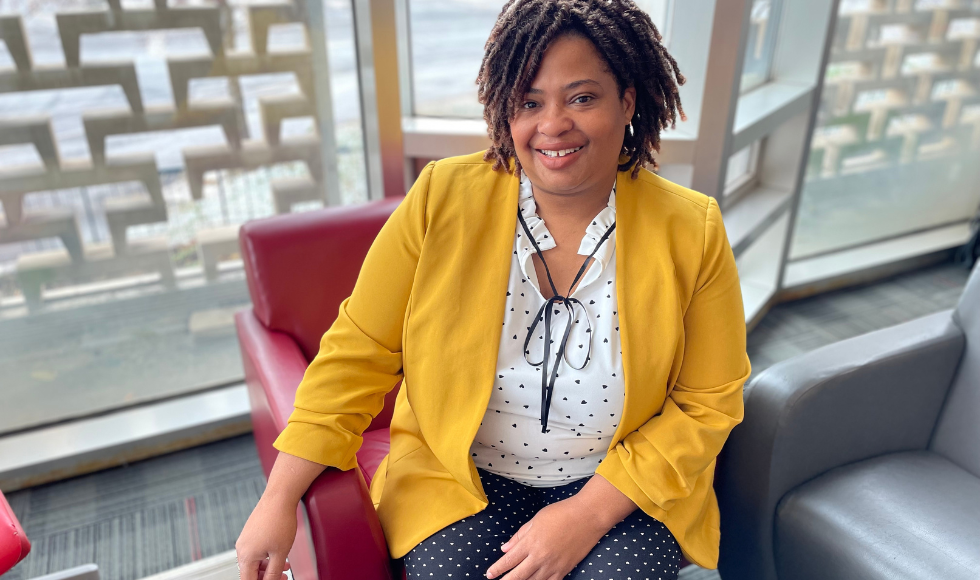Meet Crystal Mark, McMaster Libraries’ first diversity, equity, inclusion and accessibility strategist

Crystal Mark is the new diversity, equity, inclusion and accessibility strategist at McMaster Libraries. Photo by Caitlin Burgess
Crystal Mark is passionate about equity, diversity, inclusion and anti-oppression.
After spending more than 20 years in the field, she brings her expertise to McMaster University Library and the Health Sciences Library as the inaugural diversity, equity, inclusion and accessibility strategist.
Mark has worked with various non-profit organizations and has a passion for teaching community justice workshops. She spent the past five years as an education, awareness and outreach consultant in the office of the vice-president, equity and community inclusion, at Toronto Metropolitan University.
Mark says she was drawn to the role at McMaster University as it was a perfect fit for her as someone who loves reading, learning, poetry and knowledge keeping.
We spoke with Mark about her early goals for this new role, how she plans to connect with the McMaster community, and why her work matters.
Can you tell us what your new role entails?
My role is to embed diversity, equity, inclusion and accessibility (DEIA) into the framework and infrastructure of the libraries. I will be creating activities and processes that are going to allow us to bring greater inclusion into the workplace, have an anti-racist framework, and consider accessibility as some of our core tenants of how we run the libraries. In addition to that, I’m also creating documents. For example, I recently created a primer on pronouns for people to understand why pronouns are important, how to use them, and how to not use them. I’m also creating an onboarding document with guiding principles and definitions so that we’re all on the same page in our language around DEIA. How we communicate is such a big part of how we treat each other.
Why does your work matter?
It matters because it’s at the crux of our sense of humanity. DEIA work includes all of us. If we do it right — sometimes we try and we fail and that’s okay — then we are working towards a world that is more inclusive. It means a better quality of life; that people feel confident about who they are as they come to work because they can share their whole selves. It’s important that everyone is invested in DEIA because it’s everyone’s conversation, everyone’s discussion, everyone’s dialogue and everyone’s responsibility.
What are your measures of success?
One measure of success would be if people felt more comfortable talking about race, accessibility, disability, and justice, and if people who have privilege championed these groups and these issues in our work culture. Another measure of success would be collaboration with other departments on campus and more engagement with students.
How do you plan to engage the McMaster community?
I’d like to go out and meet with people. I hope to run some events that will be student, staff, and faculty driven, that would make people want to come into the library space and be happy to be here and talk about life, politics, justice and more. I think it would be excellent if we could create spaces to have those conversations.
I understand you’re a writer. Tell us about your work.
I write social political theory, poetry, and creative non-fiction. In the next five years, I want to publish my first book. I’ve been writing poetry since I was a little girl. I think of poetry as a way to engage principles of action, justice, legacy and purpose, and it’s a wonderful way to thread words together. It’s like magic for me. I’m also hoping to publish my poetry collection soon. My friends call me the wordsmith or the word bully because I push people and words further.
Is there anything we might not know about you that you’d like to share?
My favourite colour is yellow. I consider myself to be the glue of my family tree because I keep everybody together. I love reading and writing poetry, I’m a bit of a fashionista, and I’m obsessed with some older shows called Medium and Brooklyn Nine-Nine. I still want to travel the world. For fun I like walking, canoeing and kayaking. I am the happy mother of four children, and a godmother to a whole bunch of kids.
Is there anything else you would like people to know?
I love to think of DEIA work as a baton. You’re given 30 to 40 years in your career, and you’re handed a baton. Your responsibility is to take up that leg of the race. While I take up my leg of the race, I want to build legacy and trust within organizations and people. I want to allow people to speak freely, to get it wrong, to move forward, and to try again. When I’m done with my work, I hand the baton off to the next generation. I know that I can’t solve the world’s problems in 40 years, but I can try, and we should all try. I think that if I do it right and I make my mark — pun intended — then we will have a more inclusive, equitable space for learning and teaching here at McMaster Libraries.


